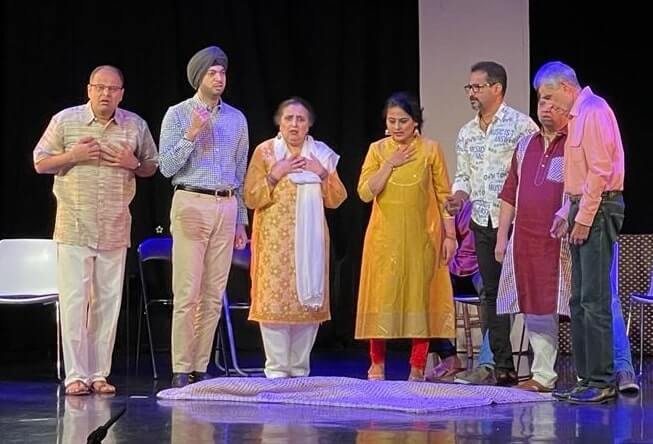At the end of the staging of the play Black With Equal in Sydney recently, the question was asked, almost too tentatively: Are we all, to some degree, racist?
It almost urged one to stand up and say, well, hell yeah… and there’s no need for you to utter those words with such caution and uncertainty.
Sydney-based theatre group Natak Mandali’s latest production was written in the early 2000s by Vikram Kapadia, writer and actor in Mumbai’s theatre and film industry. Yet its essence continues to resonate today, not just within India but in diasporic communities outside of it. Perhaps even more so, given the deeply polarised world in which we now live.
“It’s socially relevant, and brave enough to engage the audience in an open conversation about certain taboos in our society,” director Dinsha Palkhiwala told Indian Link. “The message is that unity does not mean uniformity, and that harmony does not equate to homogeneity.”
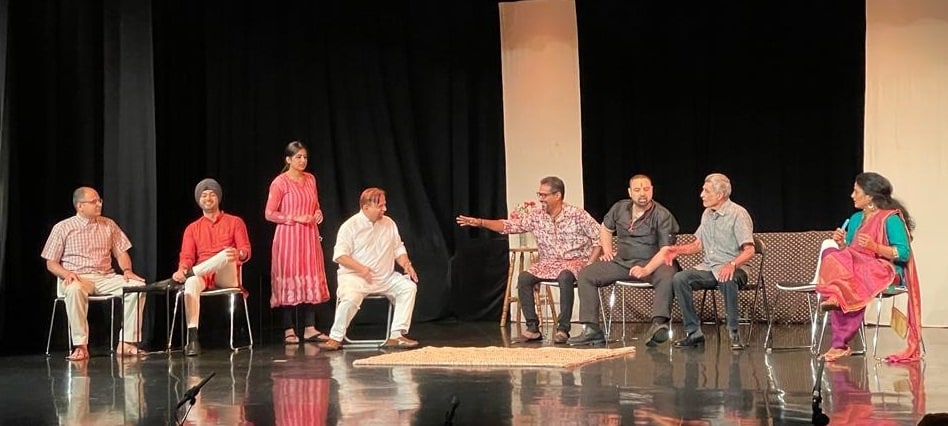
READ MORE: Artist Dhotre celebrates his mother in his drawings
Black With Equal is based on the prejudices that we continue to harbour against groups of people in our immediate surrounds. These prejudices live right under our skins, festering; scratch the surface ever so lightly, and they’ll spurt out their ugly purulent discharge to make the world a hideous place.
In the play, the ugly discharge surges out inside a Mumbai apartment block.
The apartment block – with residents from all backgrounds and ethnicities – is a microcosm of the country at large, and so works well as a metaphor for society.
The apartment block in question, Jagruti Co-operative Building Society is appropriately named, because its inhabitants are in dire need of jagruti (enlightenment) about harmonious living.
Except of course, they each believe they are enlightened, so when tempers flare, it becomes a free-for-all based on ethnic differences. Group allegiances are brought out to establish loud claims to patriotism and true ‘Indianness’, and ranted arguments are made about others towards the exact opposite.
The farce of it all should make you laugh, but you gaze nonplussed at the unfolding debacle because you know it mirrors real life at some deep level.
Meanwhile, pressing issues in the Building Society are swept aside – the lack of parking space; illegal gardens; leaking balconies; disturbing late-night parties.
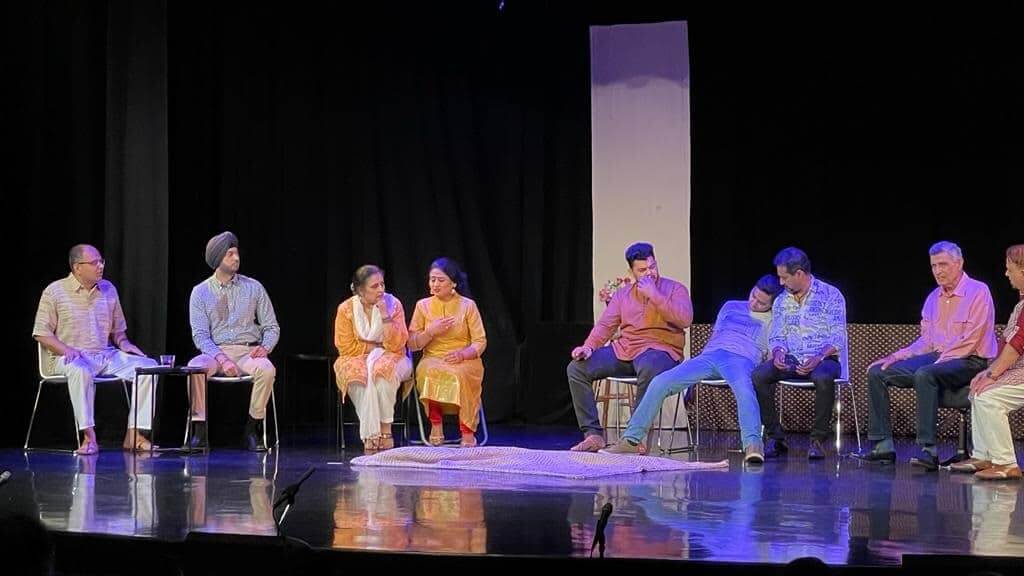
The cast dazzled with near-perfect fits to their roles, and settled into their characters niftily. By the time they got into the thick of it all, you felt as if you’d been following a fond family closely.
The language, with bits of traditional vernacular thrown in, was contemporary and added authenticity.
Hemal Joshi portrayed the older, wiser, by-the-book president of the Society, Ramnik Bhai wonderfully, his angst coming through as he felt himself dragged around by the strength of forces beyond his control.
Aparna Tijoriwala was brilliant as the garrulous, glamorous gossipmonger Rashida. (Is there anything Aparna cannot do?)
Anshul Chopra was equally convincing as Sukhbir, getting the accent down pat.
Noshir Irani’s proud Hodivala was a delight to observe, the Parsi mannerism and turn of phrase coming through charmingly.
Nisar Sirguroh was able to translate his character Usman’s desire for harmony, even though he was not averse to taking a stronger stand in the face of venom spewed at him.
Taufeeq Ahmed Sheikh brought in a touch of comic relief as the quintessential Mumbai goon, in his shiny black costume and beads. He owned the role, and that classic manspread at the Building Society meeting – one of the memorable scenes in the play.
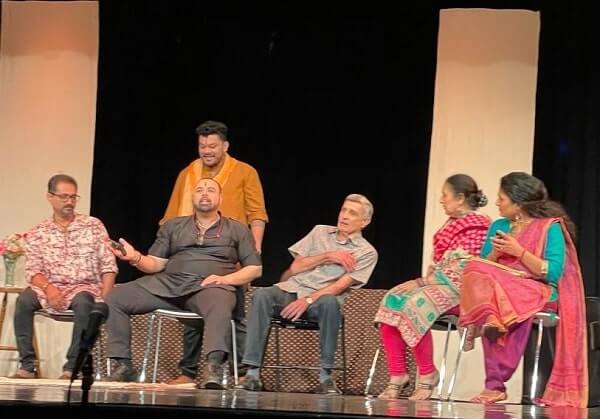
Bobby Phillips was effective as the capitalist Chatterjee – and although he did his best with his character’s accent, there was an easily forgivable slip or two.
Mittal Bhavsar evoked a sense of intrigue as the mysterious Saldanah, especially as he channelled a very dead Bernie from Weekend at Bernie’s.
READ ALSO: Mahesh Dattani’s TARA
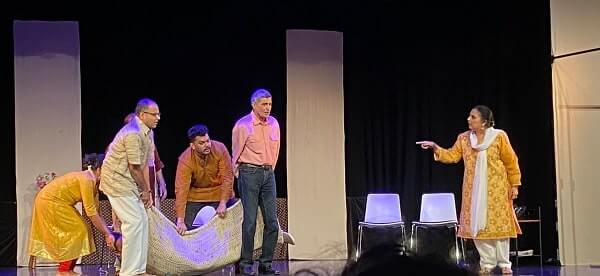
A special mention to Shalvi Singh as Maneesha, the Society President’s daughter-in-law, a wonderfully understated role played to understated precision.
As she struggled to keep on track with the Society-wallahs, such as their wildly varied tea and coffee demands, it was a telling mandate on diversity.
Maneesha gradually built herself up from the ‘insipid wallflower’ to become the only one with her head screwed on right. “How far back will you all go, to prove your patriotism?” she asked her neighbours after their raucous arguments about their own community’s historical contributions to nation-building.
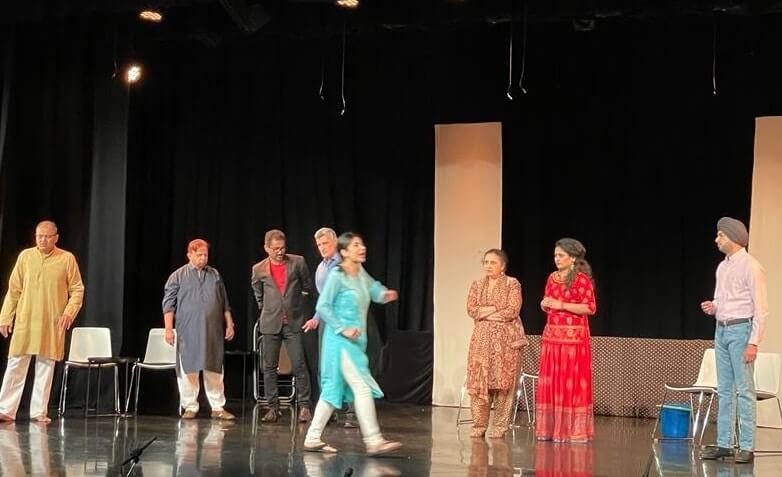
A symbol of the hope and dreams of the youth, her ‘community’ want to move us on from the fractious current: they want to build gardens, not tear down buildings, and in their quest for peace, they’re happy to move beyond borders even if it means giving up on it all.
And yet, it was with Maneesha that we saw the saddest part of the play: dreams can, and often do, go unfulfilled.
In the end, it was at her house that the Society-wallahs gathered to huddle, as unnamed forces wreaked havoc one night. They’d rushed out screaming, in their night clothes – which were, eerily, uniform.

It was finally clear, too late, that with their outer layers peeled off, everyone was just the same as everyone else.
READ MORE: Design our Diwali greeting card: Art competition announcement!



